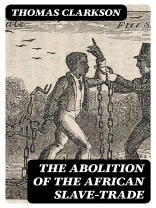In his seminal work, ‘The Abolition of the African Slave-Trade, ‘ Thomas Clarkson meticulously documents the harrowing realities of the transatlantic slave trade, revealing its moral depravity through rigorous research and firsthand accounts. Clarkson employs a deeply persuasive literary style, combining empirical data with impassioned rhetoric to evoke empathy and foment public outrage. His historical account is situated within the broader context of Enlightenment values championing liberty and human rights, making his arguments not merely a call to action but a philosophical plea for justice. Thomas Clarkson, a staunch abolitionist and social reformer, drew upon his extensive travels and interactions with erstwhile slaves and abolitionist sympathizers to craft this pivotal text. His experiences witnessing the inhuman conditions of the slave ships galvanized his commitment to the abolitionist cause. Clarkson’s background as a Quaker, entrenched in the values of equality and moral responsibility, further fueled his lifelong dedication to ending the slave trade, making him a key figure in the movement. This book is not only a critical historical document but a profound moral appeal that resonates today. Readers interested in social justice, human rights, and the historical context of abolition will find Clarkson’s passionate argumentation and thorough research both enlightening and inspiring. It is an essential read for anyone seeking to understand the roots of one of humanity’s greatest moral crises.
Sobre el autor
Thomas Clarkson (1760-1846) was an eminent English abolitionist whose pioneering efforts were instrumental in the fight against the transatlantic slave trade. Born on March 28 in Wisbech, Cambridgeshire, he dedicated much of his life to the struggle for human rights and social justice. Clarkson’s influence was marked by his seminal work, ‘The Abolition of the African Slave-Trade’, published in 1808, in which he compiled extensive research and eyewitness accounts into a compelling argument against the trade. Clarkson’s meticulous work alongside his moral conviction made him a key figure in the abolitionist movement, and his literary style combined rigorous documentation with passionate advocacy. His scholarship not only illuminated the barbaric nature of the slave trade but also helped to sway public opinion and influence legislation that ultimately led to the passage of the Slave Trade Act of 1807, which abolished the slave trade in the British Empire. Beyond his abolitionist work, Clarkson was also a proponent for animal rights and supported various humanitarian causes throughout his life. His legacy is enshrined in the annals of history as a testament to the enduring power of moral conviction and the written word in effecting social change.












